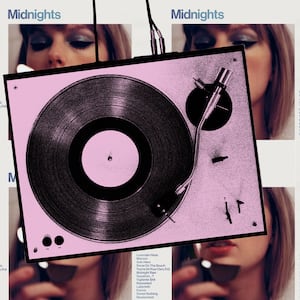Carly Rae Jepsen opens her newly released fifth album, The Loneliest Time, by recounting some advice from her therapist: “I paid to toughen up in therapy / She said to me, ‘soften up.’”
For fans of Jepsen’s high-gloss, heart-eyed synth-pop, it sounds like curious advice: This is the woman who’s been dubbed “pop’s high priestess of Big Emotions” and who made an entire album called Emotion that cemented her status as a treasured (yet somehow, still underrated) artist. How can someone so seemingly in touch with her feelings possibly need to soften up?
Therein lies the tension of that opening track, “Surrender My Heart”: the balance between wielding your sword—as she, quite literally, does onstage—and, well, surrendering your heart. Spoiler alert: Jepsen opts for the latter route, shouting that she wants to be “brave enough” to open up before launching into the kind of stratospheric chorus her fans have come to expect from her. It’s classic Carly Rae, and it’s also an efficacious table-setter for the rest of the album, which finds her digging deeper and getting more introspective than she ever has before.
The Loneliest Time—aptly titled, since it was recorded during the pandemic—was inspired by the “extreme human reactions” that loneliness can breed. That isn’t exactly unexplored territory for Jepsen, who’s covered solitude on “Party for One” and “Solo,” and yearned deeply on “Gimme Love” and “Your Type.” This album, however, feels like a more intentional step in that direction, while also letting Jepsen explore new sonic terrain as she dips into folk and smooth disco. While it doesn’t quite reach the scorching neon energy of Emotion, that doesn’t seem to be the point; she sounds content with being more low-key and mining some grit beneath the glitter.
And she certainly finds some gems in the process, including on track two, “Joshua Tree.” With all due respect to Taylor Swift's attempt to co-opt the midnight hour this October, Jepsen may have bested her with The Loneliest Time; six of these 13 tracks mention the moon, and she relishes in feeding her Scorpio spirit while feeling all her feelings to the fullest extent. “I’m feeling dramatic, I like the moon and the magic,” she sings on “Joshua Tree,” before a stutter-step of a hook that dips low when you think she’ll go high.
That kind of heel turn may be disappointing to fans who only look to Jepsen for those pure-pop, big-hook moments. They’ll still find plenty to love on The Loneliest Time—“Talking to Yourself” certainly delivers, if you can overlook some distracting production choices. And “Shooting Star” is a burst of flirtatious, roller-disco energy; you can imagine Kylie Minogue’s ears burn as Jepsen’s vocoder-altered voice asks, “Do you wanna? Do you wanna?” before spilling over in a rush of euphoria.
For the most part, though, Jepsen was onto something when she introduced this album with the warm, dulcet “Western Wind” in May. That song’s key collaborator, producer and ex-Vampire Weekend member Rostam Batmanglij, pops up again on the brilliantly titled “Go Find Yourself Or Whatever,” a moody, mandolin-assisted ballad about a breakup that left Jepsen feeling “hollow.” Even so, she’s never biting or cruel as the song’s title might suggest, instead promising her fickle partner, “I’ll wait for you.”
Indeed, even in her lowest moments, Jepsen never lets cynicism win. After the arrival of “Western Wind” and the reveal of her Baroque, Williams Sonoma-style album art, I speculated that she was going full Sad Girl Autumn. But, contrary to what the title The Loneliest Time would have you believe, many of these songs are Jepsen at her most loved-up and blissed-out. On previous albums, she might’ve expressed that passion through shouted squeals and bursting saxophone riffs (à la her best song from her best album), but here, she’s mellowed out.
Take “Sideways,” on which Jepsen has the unabashed swagger and oblivion of someone who’s so in love they can’t see straight; you can practically hear her smiling through your headphones. And then there’s “So Nice,” which finds her swept off her feet by someone who’s “so nice, incredibly honest, polite.” On both those tracks, she resorts to filling in the space with “la la la’s” and “da da da’s” when language will seemingly no longer do her love justice. As opposed to someone like Swift, who you can imagine agonizing over every single word of her songs to make sure it’s the perfect one, Jepsen is content to let the vibes flow. The words, it seems, don’t have to be perfect or scholarly or sophisticated; as long as the feeling comes across, that’s what matters.
In the hands of another artist, that kind of squishy sweetness could come across as delusional, but Jepsen manages to sidestep that. Now 36 and a decade removed from “Call Me Maybe,” she’s realistic and self-aware, sometimes jarringly so. The balmy “Bends,” a surefire album highlight, is one of her most emotionally piercing songs yet, about the scariest parts of falling in love. “After all the clouds have dried / Here’s a jar of tears I’ve cried / Keep it in a sacred place … ‘Cause I can feel the darkness sometimes too,” she sings, as if she’s just wrapped her entire heart in bubble wrap and is hand-delivering it to your door, praying you don’t break it but fully aware that you could.
There’s a reason why, as previously mentioned, Jepsen’s fans have a tradition of presenting her with toy swords at her live shows—she’s their warrior princess, ready to cut to their biggest feelings. But as The Loneliest Time proves, that doesn’t mean she can’t soften up and de-sharpen her blade at the same time. Her therapist must be proud.








